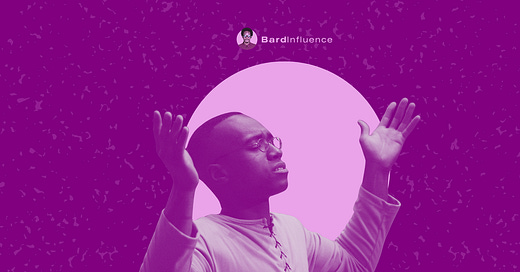Dearest Gentle Reader,
When the world gets heavy and logic fails to soothe us, many of us turn inward—or upward.
There’s something sacred about the way men reach for meaning when they’re hurting. Some turn to alcohol. Others satisfy sexual urges. The workaholics immerse themselves in endless work. The exhausted sit in silence. Others kneel in prayer. Some find God in a church. Others find peace on a balcony at 2 a.m., puffing their worries together with cigarette smokers into the night air. Whatever the shape it takes, life's burdens—when it’s heavier than normal—makes some men turn spiritual.
But it’s not always so simple.
For many men, faith has been both a refuge and a battleground. Some grew up in religious homes where feelings were dismissed with scriptures, mental illness was called a “spirit,” and therapy seen as a lack of faith. Others were taught to pray away pain, but never taught how to process it. So they learned to perform piety while privately unraveling.
And yet, even with that baggage, faith and spirituality still hold powerful potential for restoration.
True spirituality does not demand perfection. It creates space for wrestling doubt and emotion. It says, “Come as you are—even broken, even lost.” It does not compete with therapy; it can complement it. Prayer can be powerful, but so can introspection, community, and trained mental health support. They are not enemies. They are allies on the road to wholeness.
Spirituality gives language to things too heavy for reason to explain. It reminds a man that he is more than his worst day, trauma, and what society expects him to be. It reintroduces him to hope, not as a fantasy of escape, but as the promise that pain does not have the final say.
If you’ve distanced yourself from faith because of shame, guilt, or rigid teachings, you can return. Your healing is not disqualified by your questions. You can carry your bible and your therapy journal in the same hands. You can believe in God and still need medication. You can cry in prayer and still call your counsellor the next morning.
Faith is not an escape from pain. Nope. Faith anchors you in something deeper while you glide through life's troubled sea.
So hold on and close to whatever brings you peace. Let it guide you.
—Jaachịmmá Anyatọnwụ
Read Issue 1: Why Don't Men Cry?
Read Issue 2: Tough Doesn't Mean Numb
Read Issue 3: The Armour Called “I'm Fine”
Read Issue 4: "Man Enough” is a Performance of Masculinity
Read Issue 5: When Boys Become Men Without Becoming Whole
Read Issue 6: The Loneliness Epidemic
Read Issue 7: Perfectionism: The Myth Of Never Enough
Read Issue 8: They Say It's Competence, Yet The Man Is Functioning But Fading
Read Issue 9: For Most Men, Hustle Is Self-escape
Read Issue 10: Why Support Often Comes Too Late
Read Issue 11: Fatherhood And Emotional Distance
Read Issue 12: Pressure to Provide, and the Quiet Shame of Falling Short
Read Issue 13: Men should build friendship beyond banter
Read Issue 14: Why Men Only Get Their Flowers When They're Dead
Read Issue 15: Why Some Men Fear Intimacy (But Crave It Deeply)
Read Issue 16: When Men Become The Therapist Friend
Read Issue 17: How Friendships Save (or Starve) a Man’s Soul
Read Issue 18: The Unspoken Bond: Platonic Male Affection
Read Issue 19: Accountability vs. Shame
Read Issue 20: Why Many Men Struggle With Asking For Help
Read Issue 21: Men and Anxiety: It’s Not Just Stress
Read Issue 22: Depression Doesn’t Always Look Like Sadness
Read Issue 23: There’s No One Way to Be a Man





Faith is still powerful, no matter what people have turned it into.